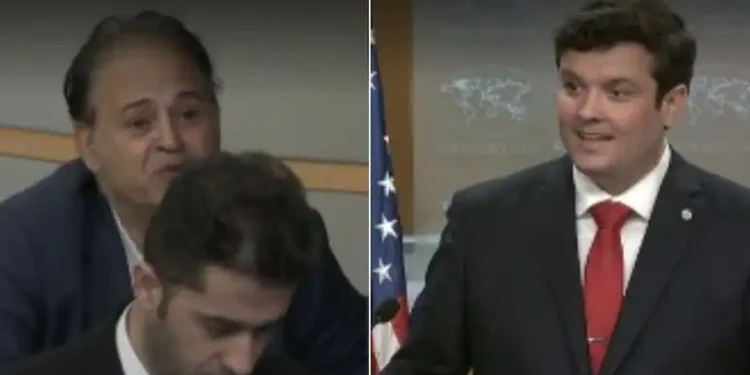The United States firmly shut down a Pakistani journalist’s attempt to question Prime Minister Narendra Modi’s stance on de-escalation talks between India and Pakistan during a US State Department briefing on Tuesday. The reporter suggested that President Donald Trump had brokered a ceasefire between the two nuclear-armed neighbours, and claimed that India had not welcomed the alleged peace initiative.
At the press briefing, the Pakistani journalist framed Trump as a “peacemaker” who sought to end the conflict and implied that Prime Minister Modi’s purported refusal to welcome Trump’s efforts was a diplomatic slight. “Pakistan welcomed President Trump’s efforts for bringing the ceasefire between Pakistan and India, and they believe that President Trump could win a Nobel Peace Prize if he were to bring peace between Pakistan and India on the Kashmir issue. But Prime Minister Modi did not welcome this effort… Does that disappoint this building at all, the attitude of Narendra Modi of not welcoming this peace deal?” the journalist asked US Department of State Principal Deputy Spokesperson Tommy Pigott.
Pigott, however, avoided taking the bait and emphasized that the United States remains focused on maintaining the ceasefire, not on assigning blame or validating speculative narratives. “That is what we are happy to see. That’s where our focus remains. And we want to see a ceasefire be maintained, and we want to encourage direct communication. That is our focus here. Our focus is the ceasefire,” Pigott asserted, redirecting the conversation away from inflammatory rhetoric.
India, on its part, has maintained that the ceasefire was not brokered by the United States but was initiated by the Pakistani Director General of Military Operations (DGMO), who requested an immediate truce following India’s decisive strikes on terror camps in Pakistan and Pakistan-Occupied Kashmir under Operation Sindoor. Indian military officials have consistently underscored that the ceasefire was driven by Pakistan’s desperation to de-escalate a rapidly intensifying conflict.
Trump as a ‘Peacemaker’
During the briefing, the Pakistani reporter persisted in positioning Trump as a global peacemaker and even suggested that Trump could be a candidate for the Nobel Peace Prize if he resolved the longstanding Kashmir conflict. “He’s a peacemaker. He values peace. He’s also a dealmaker, and he has shown that again and again and again in terms of both pursuing an America First agenda but also pursuing peace and wanting to see peace and conflicts come to an end,” Pigott said, emphasizing Trump’s diplomatic efforts.
However, the narrative of Trump brokering the ceasefire was effectively debunked by Indian officials, who pointed out that the ceasefire was requested by Pakistan, not imposed or orchestrated by the United States. Moreover, they highlighted that the Indian government remains vigilant against what they described as Pakistan’s continued attempts to project itself as a victim of aggression while engaging in cross-border terrorism.
Drone Controversy and Israel Angle
The Pakistani journalist further attempted to stoke controversy by raising questions about India’s use of Israeli-made drones during Operation Sindoor, suggesting that the deployment of such drones could complicate relations between Pakistan and Israel. He pointedly remarked that Trump’s efforts to unite Jews, Muslims, and Christians through the Abraham Accords could be jeopardized by India’s use of Israeli technology in military operations against Pakistan.
Pigott, however, remained unfazed, reiterating that the United States is solely focused on maintaining the ceasefire and promoting direct communication between the parties involved. He dismissed attempts to link Trump’s diplomatic initiatives with specific military operations or military assets used by India.
Pakistan’s Misinformation Campaign
Indian officials and analysts have repeatedly accused Pakistan of employing misinformation and disinformation tactics to shape the global narrative around the conflict. They assert that Islamabad has been using half-truths and fabricated claims to depict itself as a victim of Indian aggression while concealing its own actions, including the use of advanced weaponry supplied by China and Turkey.
During Operation Sindoor, Pakistan reportedly deployed Chinese-made PL-15 missiles, Turkish-supplied Byker Yiha and Asisguard Songar drones, and long-range rockets against Indian military installations and civilian areas. Additionally, Pakistan’s air force was reported to have used China’s J-10C fighter jets to target Indian sites, further highlighting the extensive use of foreign military technology in its operations.
India, in contrast, has underscored its operational restraint during the conflict, emphasizing that it targeted terror camps and military installations without causing civilian casualties. Indian officials have accused Pakistan of using civilian aircraft as shields to avoid detection and retaliation, a tactic that they claim exemplifies Pakistan’s disregard for international norms and civilian safety.
Ceasefire and Diplomatic Calculations
Despite Pakistan’s attempts to position itself as a peace-seeking nation willing to accept US intervention, Indian analysts assert that Islamabad’s actions reveal a different reality. They argue that the ceasefire request was a strategic retreat rather than a genuine effort to de-escalate tensions, driven by mounting losses and the international community’s growing scrutiny of Pakistan’s links to terror networks.
The US State Department’s restrained response to the Pakistani journalist’s provocative questioning is seen as a deliberate effort to avoid being drawn into a regional conflict that has complex historical and geopolitical dimensions. Instead of taking sides or endorsing speculative narratives, Washington has opted to emphasize the need for restraint, direct communication, and adherence to the ceasefire agreement.
While the Pakistani journalist sought to project Trump as a Nobel Peace Prize candidate and a global peacemaker, the US response remained focused on pragmatic diplomacy and conflict resolution, reiterating its position that both India and Pakistan should engage in direct dialogue to prevent further escalation.
Also Read : PM Modi Asserts India’s Firm Stand Against Terrorism in Powerful Message















 Categories
Categories









